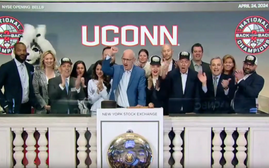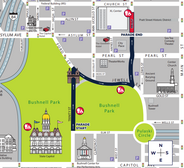Processing Your Payment
Please do not leave this page until complete. This can take a few moments.
-
News
-
Editions
-
- Lists
-
Viewpoints
-
HBJ Events
-
Event Info
- 2024 Economic Outlook Webinar Presented by: NBT Bank
- Best Places to Work in Connecticut 2024
- Top 25 Women In Business Awards 2024
- Connecticut's Family Business Awards 2024
- What's Your Story? A Small Business Giveaway 2024 Presented By: Torrington Savings Bank
- 40 Under Forty Awards 2024
- C-Suite and Lifetime Achievement Awards 2024
- Connecticut's Health Care Heroes Awards 2024
-
-
Business Calendar
-
Custom Content
- News
-
Editions
View Digital Editions
Biweekly Issues
- April 29, 2024
- April 15, 2024
- April 1, 2024
- March 18, 2024
- March 4, 2024
- February 19, 2024
- February 5, 2024
- January 22, 2024
- January 8, 2024
- + More
Special Editions
- Lists
- Viewpoints
-
HBJ Events
Event Info
- View all Events
- 2024 Economic Outlook Webinar Presented by: NBT Bank
- Best Places to Work in Connecticut 2024
- Top 25 Women In Business Awards 2024
- Connecticut's Family Business Awards 2024
- What's Your Story? A Small Business Giveaway 2024 Presented By: Torrington Savings Bank
- 40 Under Forty Awards 2024
- C-Suite and Lifetime Achievement Awards 2024
- Connecticut's Health Care Heroes Awards 2024
Award Honorees
- Business Calendar
- Custom Content
Looking toward fall, Connecticut colleges seek shield from COVID-19 lawsuits
 Photo | Contributed
The University of Connecticut's flagship campus in Storrs.
Photo | Contributed
The University of Connecticut's flagship campus in Storrs.
There’s no consensus among Connecticut colleges on the best way to hold classes in the fall amid the pandemic, but they all agree they need new protections from COVID-19 related lawsuits.
The schools say that, because the situation is unprecedented, it’s hard to predict the liability a university may face should it allow students to return and there be an outbreak or, worse, deaths.
So, Connecticut’s public and private universities are lobbying both Congress and the Lamont administration for a shield from lawsuits from students, visitors, faculty and other staff who may contract the virus on campus. They are also concerned about class action suits over payment of tuition for classes that have been canceled or moved online.
“Colleges are facing enormous uncertainty, even when they have done everything within their power to keep students, employees, and visitors safe,” said Jennifer Widness, spokeswoman for the Connecticut Conference of Independent Colleges. “Temporary and targeted liability protections related to the COVID-19 pandemic – at the state or federal level – is needed for institutions of higher ed to re-open this fall.”
Fifteen Connecticut colleges, including Yale, Quinnipiac, and Sacred Heart universities, the University of Bridgeport and University of New Haven, belong to the conference.
Those schools are supporting recommendations by the Higher Education Subcommittee of the governor’s ReOpen Connecticut panel that asks Gov. Ned Lamont to use his executive power to provide the schools with “safe harbor” or to support legislation in the state assembly that would do the same.
“It is inevitable that some students will contract COVID-19, despite the prudent precautions undertaken by their colleges and universities,” the recommendations say. “No institution can seriously consider opening its campus if it faces the threat of lawsuits by students who become infected.”
The Higher Education Subcommittee recommended that colleges and universities that take certain precautions receive “immunity from claims based on an allegation that the individual contracted COVID-19 during the 2020-21 academic year.”
Some of subcommittee recommendations for school reopenings include testing of all students who are to live on campus seven to 14 days after they arrive at the school and “repopulating” the schools in stages. Other students should be tested too, several times during the semester, the panel said.
The panel also said students with compromised immune systems or pre-existing health conditions should be able to attend all classes remotely and professors who are 65 or older or have other vulnerabilities to the disease should be able to teach remotely.
And, of course, the subcommittee recommended plenty of social distancing in classes and labs, and even to end the practice of sharing a dorm room.
“It is also possible that conditions warrant reopening in August but the pandemic worsens in the fall to the extent that the Governor would order a new shutdown,” the Higher Education Subcommittee warned.
The report was prepared by Rick Levin, former president of Yale University, and Linda Lorimer, former vice president of global and strategic initiatives at Yale University with the help of consultants from several Connecticut colleges and Widness of the CCIC.
‘Speculative lawsuits’
Connecticut’s universities and colleges have also joined a national effort to lobby Congress for liability protections.
The schools backed a letter sent last week by the American Council of Education to congressional leaders that asked the lawmakers to approve legislation that would “safeguard higher education institutions and systems, affiliated nonprofits, and healthcare providers and facilities from excessive and speculative lawsuits arising out of the pandemic.”
“As colleges and universities assess how quickly and completely campuses can resume full operations, they are facing enormous uncertainty about COVID-19-related standards of care and corresponding fears of huge transactional costs associated with defending against COVID-19 spread lawsuits, even when they have done everything within their power to keep students, employees, and visitors safe,” the American Council of Education said.
Twenty-three Connecticut schools are ACE members, including Yale, the University of Connecticut, Quinnipiac and the entire Connecticut State Colleges and Universities system.
Senate Majority Leader Mitch McConnell, R-Ky., and Sen. John Cornyn, R-Texas, have for weeks been working on a bill that would protect businesses, non-profits, colleges and others from lawsuits filed by people who get sick or die or are otherwise harmed after exposure to the coronavirus.
But since most civil suits are filed in state courts, there are questions about the reach and constitutionality of a federal legal shield.
Anthony Fauci, the nation’s top epidemiologist, warned during a congressional hearing last month that vaccines and therapies would probably not be ready for the nation’s 5,000 universities and colleges to welcome their 20 million students back to campuses this fall. He called such hope “a bridge too far.”
Still, there are overwhelming educational and financial needs that have pressed schools to roll out reopening plans, ranging from all socially distanced in-person fall classes, to only online learning and a combination of both.
Yale, for instance, said classes will begin on August 31, two days earlier than originally scheduled, and end on December 4. But, as in many colleges that plan in-person classes, most of the studies will be completed before Thanksgiving and some classes, as well as final exams, will be held online.
Other colleges in the state have announced similar reopening programs, but the University of Connecticut has yet to say what its plan for the fall is.
Mark Kantrowitz, a higher education expert and publisher of savingforcollege.com, predicted enrollment in the nation’s colleges and universities will drop by 10% to 20% in the fall, the drop due to uncertainty about the pandemic and closed borders that keep international students out.
He said some students and their parents are upset at paying full tuition costs for the spring semester, because colleges closed and students were forced to attend online classes at home, missing out on what some call the “full college experience.”
“Who wants to pay tens of thousands of dollars to watch videos all day?” Kantrowitz asked. “A lot of learning in college comes from your peers.”
About 100 class action lawsuits have been filed against colleges over the tuition issue and more are expected to follow.
John McLaughlin, senior managing director at Gallagher, an insurance and higher education consulting firm, said he’s “100 percent behind” the efforts of the Connecticut’s colleges and universities to seek legal protections from the state and Congress.
He said insurance liability rates for colleges and universities are increasing sharply, with premiums rising 30% to 60%, and that uncertainty is rampant.
“It reminds me of the ancient mariner,” McLaughlin said, referring to a poem by Samuel Taylor Coleridge. “The schools are sailing into uncharted seas.”
McLaughlin also said there may be expectations that all colleges, regardless of their resource, are able to follow strict reopening guidelines.
“They worry ‘Are we going to be held to a benchmark we can’t live up to?” he said.

2022 Giving Guide
This special edition informs and connects businesses with nonprofit organizations that are aligned with what they care about. Each nonprofit profile provides a crisp snapshot of the organization’s mission, goals, area of service, giving and volunteer opportunities and board leadership.
Learn more
Subscribe
Hartford Business Journal provides the top coverage of news, trends, data, politics and personalities of the area’s business community. Get the news and information you need from the award-winning writers at HBJ. Don’t miss out - subscribe today.
Subscribe
2024 Book of Lists
Delivering Vital Marketplace Content and Context to Senior Decision Makers Throughout Greater Hartford and the State ... All Year Long!
Read Here-
2022 Giving Guide
This special edition informs and connects businesses with nonprofit organizations that are aligned with what they care about. Each nonprofit profile provides a crisp snapshot of the organization’s mission, goals, area of service, giving and volunteer opportunities and board leadership.
-
Subscribe
Hartford Business Journal provides the top coverage of news, trends, data, politics and personalities of the area’s business community. Get the news and information you need from the award-winning writers at HBJ. Don’t miss out - subscribe today.
-
2024 Book of Lists
Delivering Vital Marketplace Content and Context to Senior Decision Makers Throughout Greater Hartford and the State ... All Year Long!
ABOUT
ADVERTISE
NEW ENGLAND BUSINESS MEDIA SITES
No articles left
Get access now
In order to use this feature, we need some information from you. You can also login or register for a free account.
By clicking submit you are agreeing to our cookie usage and Privacy Policy
Already have an account? Login
Already have an account? Login
Want to create an account? Register
Get access now
In order to use this feature, we need some information from you. You can also login or register for a free account.
By clicking submit you are agreeing to our cookie usage and Privacy Policy
Already have an account? Login
Already have an account? Login
Want to create an account? Register










0 Comments